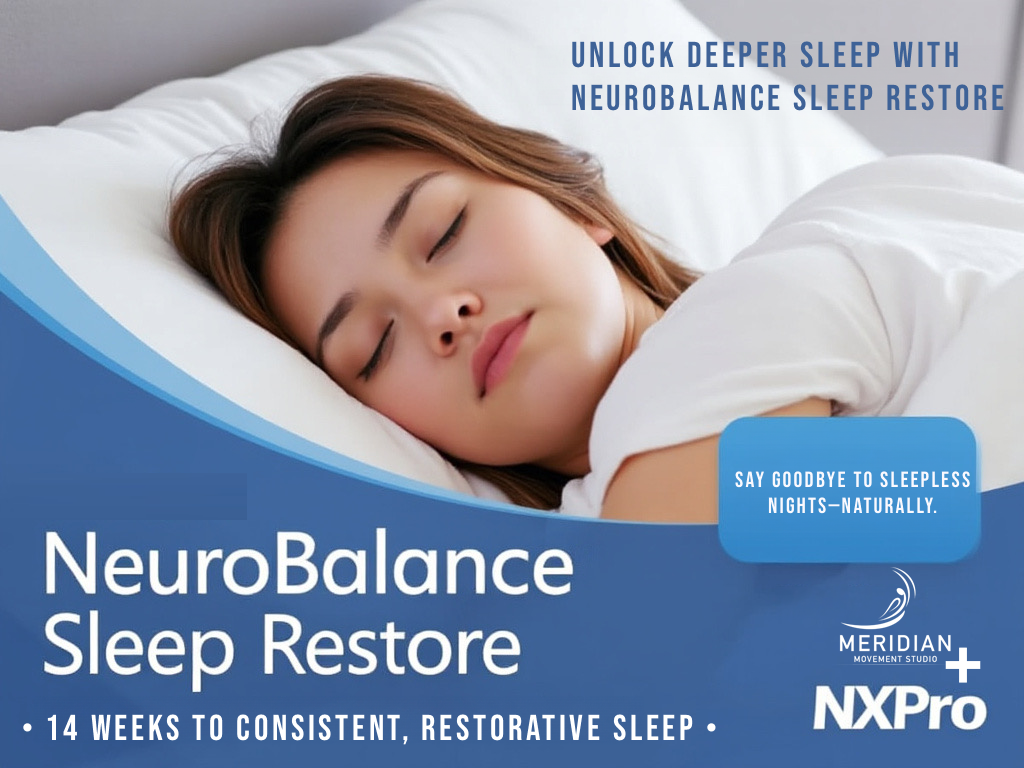Unlock Restorative Sleep: NeuroBalance SleepRestore Vagus Nerve Solution
Struggling with restless nights? NeuroBalance SleepRestore offers a science-backed solution to calm an overactive nervous system and enhance relaxation by stimulating the vagus nerve—a critical pathway for activating the parasympathetic "rest and digest" system. This non-invasive approach helps transition the body into a restorative sleep cycle by reducing cortisol levels and lowering heart rate, addressing the root causes of disrupted sleep.
Unlike temporary fixes, NeuroBalance SleepRestore targets the nervous systems natural regulatory mechanisms, promoting deeper sleep stages and improving sleep quality over time. Say goodbye to disrupted sleep and wake up feeling refreshed, energized, and ready to tackle your day. By integrating vagus nerve stimulation into your weekly routine—such as using the device during relaxation practice like deep breathing —you can create a consistent sleep habit that supports long-term recovery.
Studies highlight the vagus nerves role in stress reduction, and tools like NeuroBalance SleepRestore align with these findings by providing a targeted method to activate its calming effects.
How the NXPro Device Abolishes The Need For Aid-Dependent Sleep!
Join Our Sleep Revolution:
Transform Your Nights, Transform Your Life
The Comprehensive Benefits of Quality Sleep: A Scientific Perspective
Quality sleep represents a cornerstone of human health and performance, serving as a critical biological process that affects every aspect of our well-being. Modern research continues to uncover the profound impact of sleep on physical health, cognitive function, and emotional resilience. This comprehensive guide explores the science-backed benefits of quality sleep and its transformative effects on human performance.
Enhanced Cognitive Performance and Neural Health
Quality sleep orchestrates crucial neural processes that optimize brain function. During sleep, the glymphatic system activates, clearing neurotoxic waste products accumulated during wakefulness. This cleansing process, combined with neural pathway consolidation, results in:
- Enhanced memory formation and recall
- Improved decision-making capabilities
- Increased creative problem-solving abilities
- Superior information processing speed
Advanced Physical Recovery and Athletic Performance
Sleep serves as a master regulator of physical recovery, triggering numerous physiological processes:
- Peak growth hormone secretion (up to 70% of daily production)
- Enhanced muscle protein synthesis
- Accelerated tissue repair and regeneration
- Optimized athletic performance metrics
Metabolic Optimization and Weight Regulation
Sleep plays a fundamental role in metabolic health through multiple mechanisms:
- Precise regulation of hunger hormones (ghrelin and leptin)
- Enhanced insulin sensitivity
- Optimized glucose metabolism
- Improved appetite control and reduced cravings
Enhanced Emotional Intelligence and Mental Resilience
Quality sleep strengthens emotional processing and regulation through:
- Amygdala reset and emotional memory consolidation
- Improved stress hormone regulation
- Enhanced emotional intelligence and empathy
- Greater psychological resilience
Advanced Immune Function and Disease Prevention
Sleep enhances immune system function through:
- Increased production of immune-boosting compounds
- Enhanced T-cell production and function
- Optimized inflammatory response
- Improved vaccine response efficiency
Cardiovascular System Optimization
Quality sleep supports heart health through:
- Natural blood pressure regulation
- Reduced cardiovascular stress
- Enhanced heart rate variability
- Improved arterial health
Long-term Health Implications
Consistent quality sleep contributes to longevity and health span through:
- Reduced risk of chronic diseases
- Enhanced cellular repair mechanisms
- Improved cognitive preservation
- Optimized aging processes
Importance of Sleep for Children & Teenagers
Quality sleep is critical for children and teenagers, supporting physical growth, cognitive development, and emotional health. Teens require 8–10 hours nightly, while younger children need 9–12 hours. Sleep enhances brain function, improving memory, attention, and academic performance. It aids physical growth by regulating hormones like growth hormone and supports immune function.
Risks of Sleep Deprivation
Sleep deprivation increases risks of mental health issues (anxiety, depression), behavioral problems (impulsivity, risky behaviors), and health complications (obesity, cardiovascular issues). Younger children may exhibit hyperactivity instead of sleepiness.
Challenges & Solutions
Teens face challenges due to circadian rhythm shifts, making early bedtimes difficult. Practical strategies include maintaining consistent schedules, avoiding screens before bed, and encouraging short naps for teens. Schools adopting later start times and parental role modeling can improve sleep hygiene.
- Improved Sleep Quality
👉 Deeper sleep cycles, faster recovery, and enhanced mental clarity- Reduced Stress and Anxiety
👉 Calms the nervous system, promoting relaxation and emotional balance- Hormonal Regulation
👉 Supports healthy cortisol and melatonin levels for circadian rhythm alignment- Increased Energy
👉 Restorative sleep boosts daytime vitality and focus- Holistic Wellness
👉 Addresses root causes of sleep disruption, reducing reliance on substances
Don't miss this opportunity to Claim This Free Sleep Assessment.



